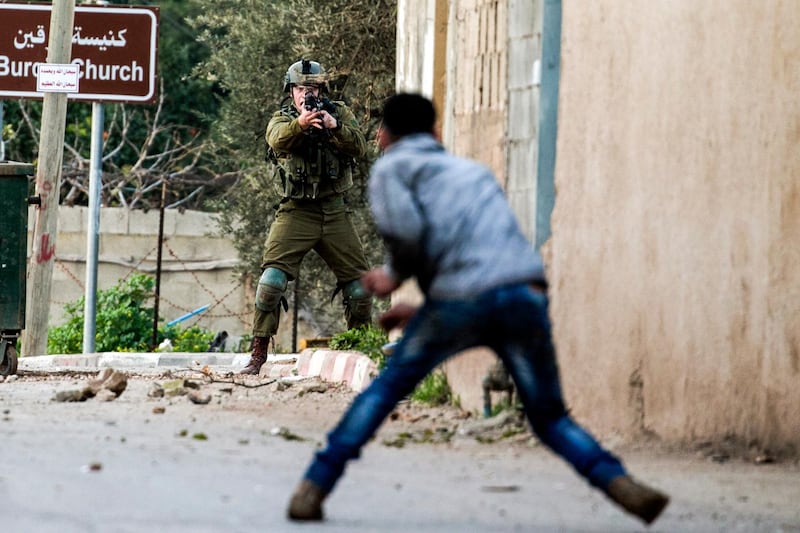Israeli soldiers shot and killed a Palestinian teenager in the West Bank village of Burqin during a raid for suspects in the shooting of a rabbi from a nearby settlement.
The Palestinian health ministry said the teenager killed on Saturday was 19-year-old Ahmad Abu Obeid. The hospital in Jenin where he was taken said he had been shot in the head.
A witness told Reuters about 200 Palestinians were throwing stones at Israeli military vehicles when a gunshot was heard, adding that a wounded person was then carried to a car.
A military spokeswoman said the rioting broke out while troops were arresting several suspects connected with the fatal drive-by shooting of an Israeli rabbi from the settler outpost of Havat Gilad on January 9.
She said troops responded with non-fatal "riot dispersal means" against Palestinians throwing rocks and firebombs and then with live fire at the main instigators.
Abu Obeid was shot after he climbed on to a military vehicle and opened its door, she said.
According to a tally by the Palestinian news agency Maan, he was the ninth Palestinian to be killed by Israeli forces this year, four of whom were 16 years old.
_______________
Read more:
Palestinian triplets named in anti-Trump Jerusalem protest
Abbas to address Security Council on Palestinian situation
_______________
A Palestinian suspected of involvement in the rabbi's killing was shot dead by Israeli forces last month in Jenin, about 35 kilometres north of Havat Gilad, but the gunman has yet to be arrested.
Israel on Sunday granted legal status to the outpost, which is home to about 50 families.
All Israeli settlements in the occupied West Bank are illegal under international law but Israel differentiates between settlements it has approved and those it has not.
Israeli Prime Minister Benjamin Netanyahu said the decision, which was passed unanimously by the cabinet, was meant to "allow the continuation of normal life there".
The move was condemned by Palestinian officials.
"Netanyahu is trying to make facts on ground. All settlements in the West Bank, including in Jerusalem, are illegal," Wasel Abu Youssef, a member of the Palestine Liberation Organisation's executive committee, told Reuters.
Meanwhile, the trial of Palestinian protest icon Ahed Tamimi before an Israeli military court has been postponed for a week and is now scheduled to begin on February 13, Associated Press reported.
Tamimi, who turned 17 in prison last week, was charged with assault and incitement after she slapped and punched two Israeli soldiers in her West Bank village in December.
The incident was filmed and the video widely shared online.
Ahed's Palestinian and foreign supporters say it symbolises the Palestinians' David vs Goliath struggle against Israel's decades-long military occupation. Israel has portrayed her actions as a staged provocation meant to embarrass the army.
Defence lawyer Gaby Lasky said on Sunday that the trial, which was to begin on Tuesday, was delayed because the prosecution was slow in sharing evidence.
The military confirmed the new starting date.
Tensions between Israelis and Palestinians have risen since US President Donald Trump recognised Jerusalem as Israel's capital in December.
Mr Trump's reversal of decades of US policy enraged Palestinians, who want to create an independent state in the West Bank and the Gaza Strip with East Jerusalem as their capital.
Israel captured those territories in the 1967 Middle East War and annexed East Jerusalem in a move not recognised internationally. It says the entire city is its eternal, indivisible capital. It pulled out of Gaza in 2005.
US-led peace talks between Israel and the Palestinians broke down in 2014. A bid by the Trump administration to restart negotiations has shown no real signs of progress, and Palestinians now say the Jerusalem decision has ruled the US out as a mediator in the peace process.






